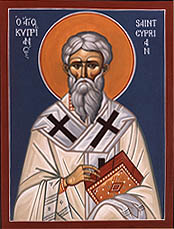One of the things common to those we call “Saints” is that they espouse unpopular causes or an unpopular faith. Quite often, there may be only a few solid objectors who disapprove of the action of those we call Saints, but others will go along rather than tried to block the tide as it were. In this hurricane season, what happens when you usually tried to span the flow is that you’re faced with a choice of staying or going. If you remain, you risk becoming trapped under a pile of rubble or a fallen tree, shredded by shards of glass, or submerged in water and need to reach the roof of the house quickly and hope that the water doesn’t come up that far. Most people, faced with such a prospect will do what they can to board up and sandbag their houses, and the really smart ones will leave town as soon as possible.
There will always be people who feel that they are nearly invincible, well able to withstand whatever nature can throw at them, and save their houses and possessions without lifting a finger. Unfortunately, that can be a big, fatal mistake. The Saints had to use their best judgment when it came to similar situations, even if not meteorologically, and choose to remain faithful or follow the majority.
One such saint was a man named Cyprian, who was born a pagan in Carthage. He was a lawyer who presented cases in court and also a teacher of rhetoric or the art of persuasive speech-making.
Cyprian was about 46 years old when he became a Christian, and a mere two years later he became the Bishop of Carthage. Hopefully, his first year was rather peaceful, because Emperor Decius began a persecution of the Christians in about 450 BCE, forcing many into hiding, including Cyprian. At the end of the oppression, things still were not calm and peaceful. Arguments broke out about what to do about those Christians who had not remained faithful to Christianity and who had denied it under threat and stress. One group wanted to close the door to those who had broken communion by denying the faith. Another group favored bringing the apostates back into the fold with no probation or penalty. Cyprian was a moderate of sorts in this particular situation. He placed strict rules on people who were venerating uncanonized martyrs of the persecution. This position made him appear to lean towards the total forgiveness of the lapsed who had denied the faith and made him look very bad in the eyes of those who supported the reverence.
One other rather significant controversy in which Cyprian was involved was that of whether or not those involved in the schism and who denied the faith should be received back into the church and under what circumstances. Carthage had an ancient custom of reception via means of anointing with oil. Rome and much of North Africa also supported this practice. Carthage, however, had turned to a tradition of receiving the apostates by re-baptism. The Pope was very much against this, and Cyprian’s party of re-baptism failed. So far, Cyprian was far from winning the pennant for his division.
And then came the plague. Cyprian did his best to set up shelters and medical relief for all who were afflicted, but unfortunately, many saw the epidemic as a sign of wrath from other deities who were anti-Christianity. It sounds somewhat like what we hear today, where both sides claim to be the saints and the opposing party being the heretics and, quite often, the causes of all the disasters.
Cyprian had run away and hidden during the previous persecution, earning the wrath and displeasure of those who had stayed and remained faithful in the very face of danger. This time, though, Cyprian stayed put and was arrested for his pains. He was imprisoned, tried, and beheaded in 258 AD.
Persecutions are like natural disasters, only abuses usually last longer and have a very definite human origin. With a natural disaster, there is often a clear sign of its appearance, and there is always a choice — stay and take one’s chances or go and significantly raise the chances of getting out of it alive. In the case of the persecutions in Cyprian’s time, the choice was to remain faithful or swear allegiance to a god or gods and escape potential death.
We still have the choice to remain faithful or to turn our backs. We have so many opportunities to choose how we will respond to life and potential disaster. We also have the responsibility of accepting the consequences of our choices, as Cyprian did. Sometimes those consequences can mean public displeasure and disapproval, while other times it can result in death by trying to do good. Jesus chose the way of death to bring us life. That is a model we can always look to, even in the worst of times.
God bless.
Image: St Cyprian of Carthage, from OrthodoxWiki at Wikimedia Commons.
Linda Ryan is a co-mentor for an Education for Ministry group, an avid reader, lover of Baroque and Renaissance music, and -retired. She keeps the blog Jericho’s Daughter. She is also owned by three cats.

